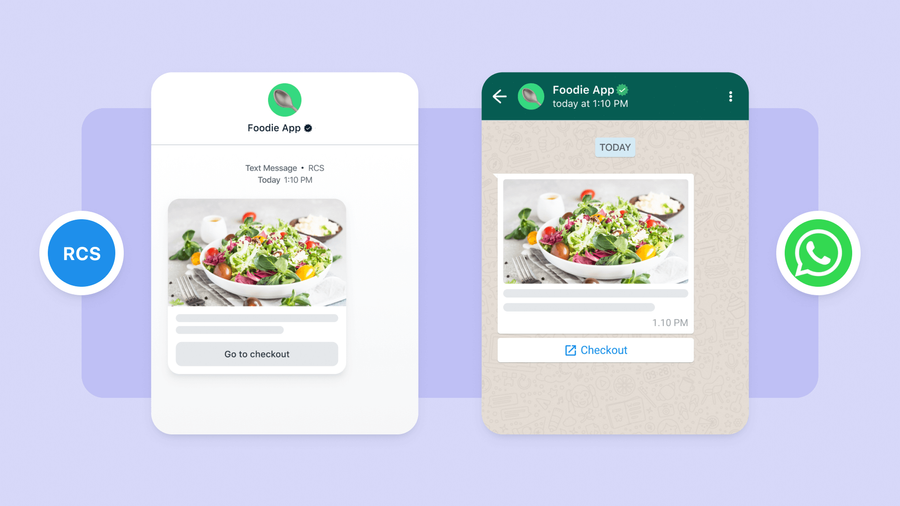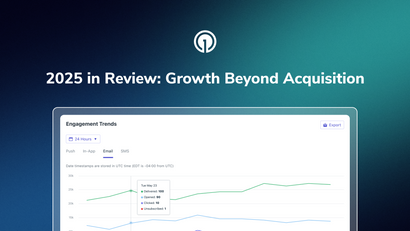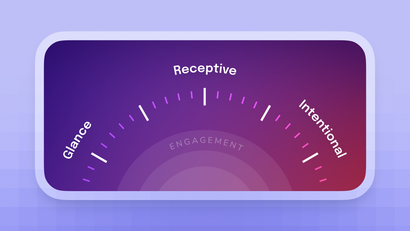For mobile-first businesses, especially ones that operate globally, messaging is much more than a “channel.” It’s a direct line to mobile user retention and revenue. WhatsApp Business has long been the default in markets like India and Brazil, offering scale and familiarity. But with Apple’s support and new advances in security and interactivity, RCS is stepping into the spotlight.
If you need a refresher on the difference between SMS and RCS, we got you covered.
If you’re serious about optimizing engagement across regions, it’s time to compare both platforms and rethink what’s possible.
Understanding RCS and WhatsApp Business
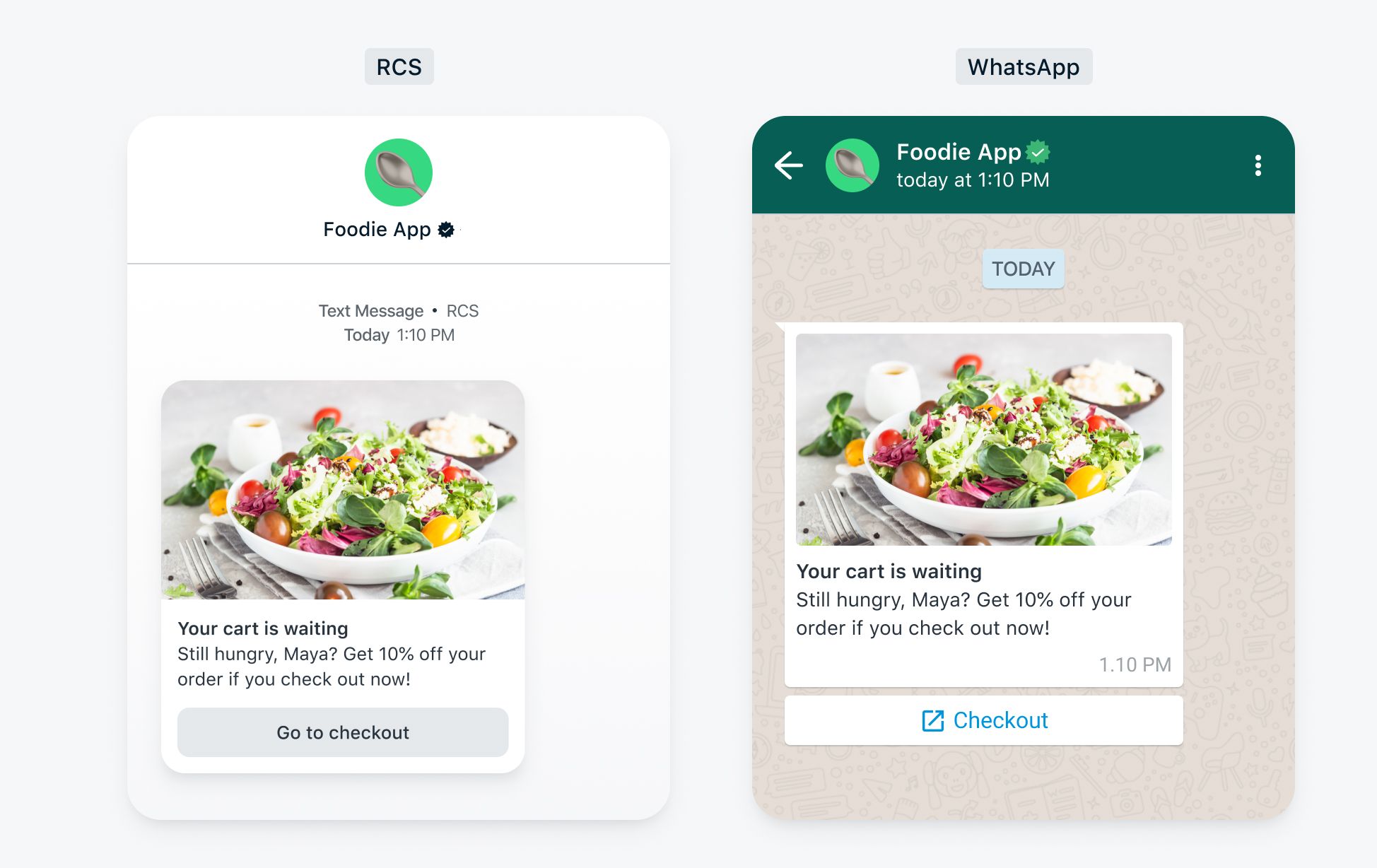
Rich Communication Services (RCS): RCS is the next generation of SMS, offering enriched messaging capabilities like verified branding, high-resolution images, videos, carousels, and interactive buttons directly within the native messaging app of a device. With Apple's support, the service now boasts an addressable market of over 5 billion users worldwide.
WhatsApp Business: WhatsApp Business provides a platform for businesses to interact with customers through the widely-used WhatsApp application. It supports features such as automated messages, chatbots, and integration with CRM systems, making it a versatile tool for some customer engagement strategies.
Comparative analysis: RCS vs. WhatsApp Business
| Feature | RCS | WhatsApp Business |
|---|---|---|
| User Reach | Integrated into native messaging apps; broad reach with both Android & iOS 18 support | Over 2.5 billion users globally; dominant in regions like India, Brazil, and parts of Europe |
| Media Capabilities | Supports rich media, carousels, and interactive buttons | Supports images, videos, documents, and interactive elements |
| App Requirement | No additional app needed; uses default messaging app | Requires users to have WhatsApp installed |
| Security | End-to-end encryption added to the RCS standard in March 2025, pending iOS implementation | End-to-end encryption for all messages |
| Business Features | Verified sender IDs, branding, and interactive templates | Automated messages, chatbots, CRM integration, and analytics |
| Cost Structure | Varies by carrier agreements, message type, and region | Charges per message; pricing varies by region and message type |
Strategic considerations: When to choose each
Choosing between RCS and WhatsApp Business doesn’t come down to which is "better" in a vacuum, it’s about which fits your business goals, markets, and customer preferences.
Below is a breakdown of key considerations to help guide your decision, with clear recommendations based on common factors for mobile-first businesses operating internationally.
📡 Market penetration and reach
What to evaluate:
Are your customers spread across Android and iOS devices in markets where WhatsApp isn't always the default? If reach is a top priority, you’ll want a platform that works across devices without limiting you to app users.
For maximizing addressable reach, RCS’s growing ubiquity across Android and iOS makes it the stronger, more scalable option.
Recommendation:
RCS or Both
👥 User base & app dependency
What to evaluate:
Do you want to reach users directly through native messaging apps without requiring a specific third-party app download? Reducing friction by eliminating app dependency can significantly boost message visibility and engagement.
For frictionless reach, especially among users who aren’t already on WhatsApp, RCS gives you direct access—no app download or account creation needed.
Recommendation:
RCS
📍 Regional preferences
What to evaluate:
Are you active in regions like Brazil, India, or Southeast Asia, where WhatsApp is heavily adopted and integrated into daily life. Messaging habits vary by region, and in some areas, WhatsApp is already the default customer communication channel.
WhatsApp vs. native messaging, by region
WhatsApp-dominant regions include:
- India
- Brazil
- Indonesia
- Mexico
- Egypt
- Spain
- Italy
In these countries, WhatsApp is often used more than SMS, even for transactional updates and business interactions.
Native messaging-dominant regions (where Android native messaging has higher traction and/or WhatsApp isn’t as deeply embedded):
- United States
- Canada
- Japan
- Germany
- France
- Australia
- South Korea
In these markets, users are more accustomed to default SMS apps, making RCS a more natural upgrade path.
Keep in mind: even in WhatsApp-heavy regions, Android still accounts for a major share of the mobile market, meaning there’s room for a dual-channel approach using both RCS and WhatsApp depending on the campaign type and context.
Recommendation:
WhatsApp Business or Both
🧩 Desired UX & message design
What to evaluate:
Do you need high-impact, branded messaging experiences with multimedia, CTAs, carousels, and interactive flows? If visual storytelling is a core part of your strategy, both channels offer rich design capabilities… but delivery context matters.
RCS lets you deliver those experiences directly into the native SMS inbox, with brand theming and interactivity—no app required.
Recommendation:
RCS
🚀 Implementation & scalability
What to evaluate:
Does your team need quick-to-launch messaging with mature API infrastructure and ready-made integrations? When time-to-value is critical, leaning into a platform with existing developer tools can accelerate deployment.
When speed to launch is key, WhatsApp Business still leads with its mature developer ecosystem and quick-start infrastructure. But RCS is narrowing the gap as more carriers and CPaaS platforms streamline onboarding and tooling.
Recommendation:
WhatsApp Business
🛡️ Security & compliance
What to evaluate:
Are data privacy, encryption, and sender verification critical to your business model or industry (e.g. fintech, healthcare)? In regulated sectors, compliance isn’t optional—it’s foundational to customer trust and legal protection.
WhatsApp Business offers proven end-to-end encryption across its messaging infrastructure today. RCS is actively catching up (adopting E2EE in March 2025) with industry-wide support continuing to expand.
Recommendation:
WhatsApp Business (Short-Term),
RCS (Future-Ready)
📊 Campaign goals & strategy
What to evaluate:
Are you prioritizing mobile re-engagement, upsells, and conversion-oriented campaigns with visual storytelling? Richer media formats and interactive templates can dramatically increase CTRs and downstream conversions.
For rich, conversion-driven campaigns that combine visuals, interaction, and automation, RCS gives marketers the creative control they need.
Recommendation:
RCS
👨💻 Customer support & live chat
What to evaluate:
Do you plan to offer interactive, real-time customer support or transactional updates through a conversational thread? If ongoing, conversational support is a key part of your strategy, WhatsApp is currently better suited for scalable, two-way interactions—though RCS is quickly evolving to support similar flows.
Recommendation:
WhatsApp Business or Both
🔮 Future-proofing
What to evaluate:
Are you looking to invest in a messaging channel aligned with long-term carrier, OEM, and platform momentum? Future-ready messaging requires alignment with where the tech ecosystem is headed, not just where it’s been.
If you’re planning for what messaging will look like two years from now (not just today) RCS is clearly where the ecosystem is converging.
Recommendation:
RCS
Looking ahead: Timing as a factor
The momentum behind RCS is real, and accelerating. With Apple supporting RCS, it’s poised to become a universal messaging protocol across major mobile platforms and the standard for rich, direct-to-consumer communication.
But here’s the catch: launching on RCS isn’t instant. There’s an RCS approval process to become a verified sender, which can take weeks to months depending on region, industry, and carrier relationships. That means brands who begin now will be best positioned to capitalize on the tidal wave of consumer reach and engagement that’s about to hit.
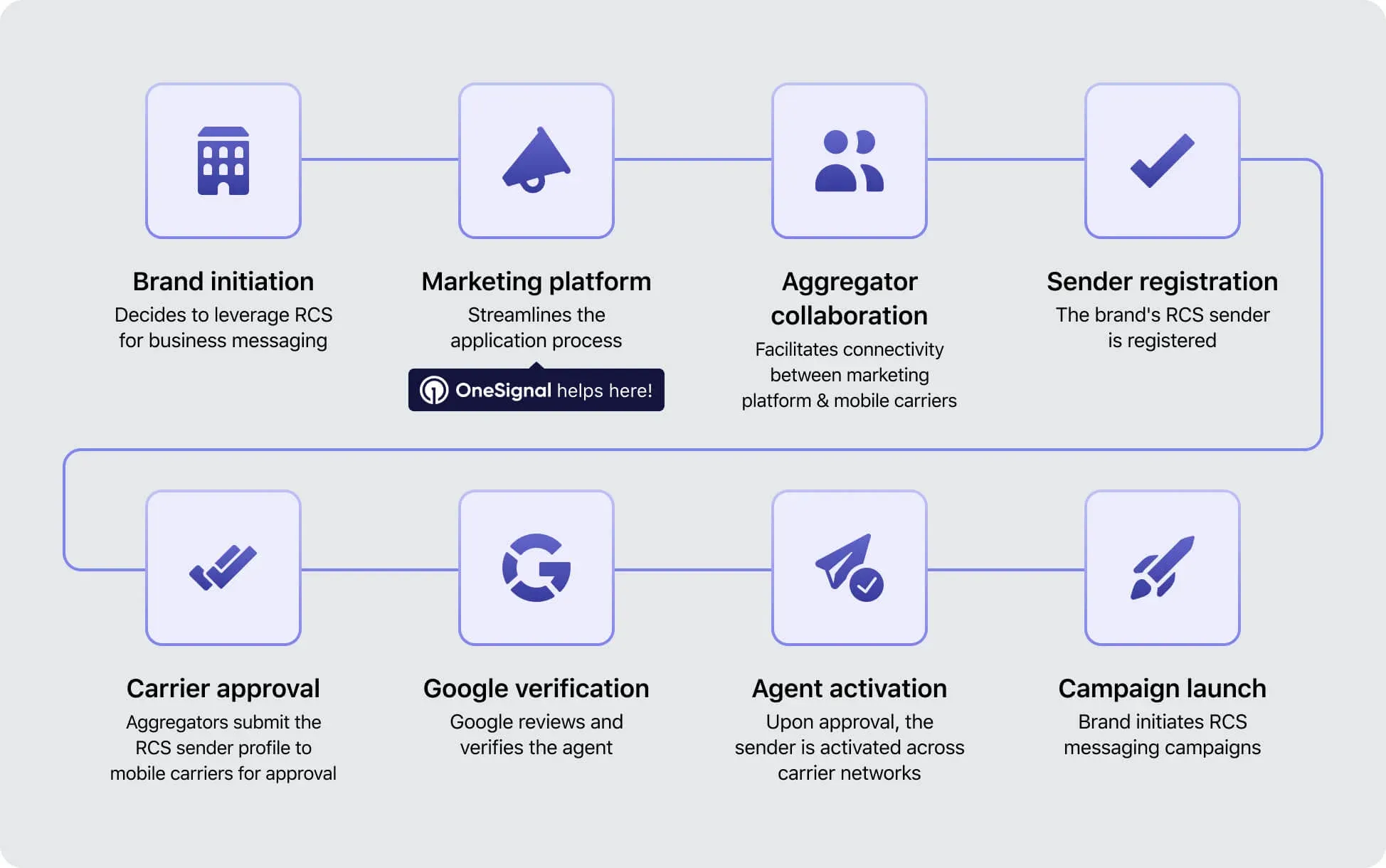
If your messaging strategy includes visual storytelling, automation, or omnichannel orchestration, RCS deserves a seat at the table—if not at the head of it.
Messaging is changing… don’t be the last to the party!
RCS is no longer the slow-moving SMS upgrade it was once perceived to be. With recent support from major Android OEMs, improved encryption standards, growing global carrier adoption (and Apple’s public commitment to bring RCS to iOS) this channel is finally stepping into the spotlight.
While WhatsApp Business still plays a vital role in many regional strategies, businesses that overlook RCS risk falling behind as messaging expectations evolve.
To launch, you’ll need to go through a carrier approval process, which involves registering your brand, getting verified, and aligning with RCS-supported messaging partners.
That’s where OneSignal comes in. As an early partner in the RCS ecosystem, OneSignal helps businesses navigate the carrier approval process, streamline onboarding, and manage their campaigns across channels—get in touch with us to learn more about how we can help you with your RCS approval.
If you're ready to unlock the next era of mobile messaging, now’s the time to get started.
Get Started for Free